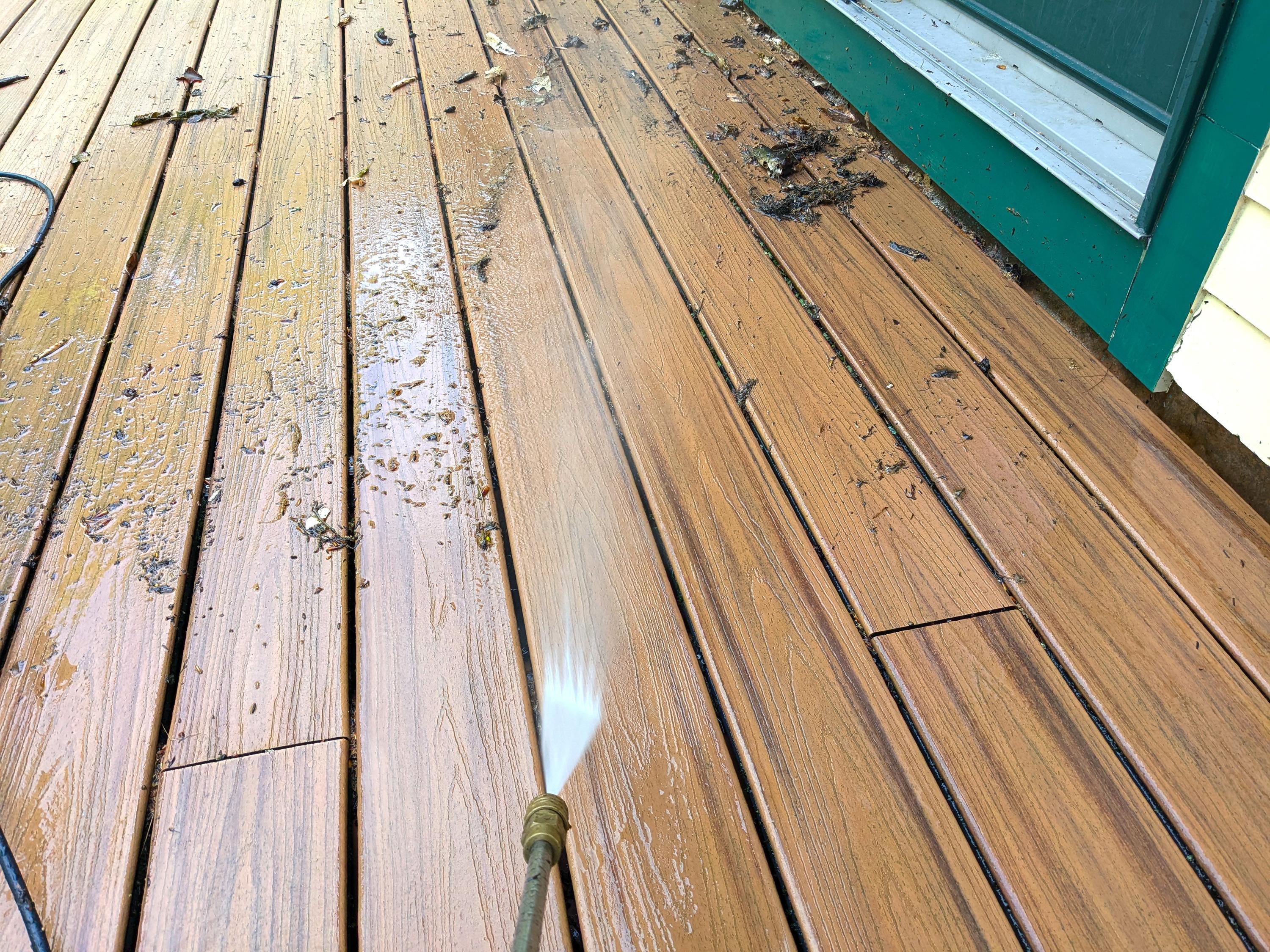Ask the Builder: Maintenance-free decks? Yeah, right!
I gave my electric pressure washer a vigorous workout this weekend. I cleaned 1,100 square feet of composite decking, 100 feet of guardrails, and a 16-foot long staircase. The project spanned two days. The decking I cleaned was marketed years ago as being maintenance-free. Bah humbug!
Allow me to provide some context. I remember when I was a young carpenter. I purchased my lumber from Hyde Park Lumber Company in Cincinnati. The orange and blue big-box retailers were not yet a glint in the eye of the founders.
I walked into the lumber company to purchase materials and saw a placard on the counter advertising new maintenance-free pressure-treated lumber. Yes, at one time, residential pressure-treated lumber was a new thing! The manufacturers thought it would be maintenance-free. As far as I can tell, they may have based their claim thinking how railroad ties, utility poles, pier piles and other outdoor lumber are not normally maintained once installed.
We all discovered the claim was wrong. Pressure-treated lumber requires extensive maintenance. You often need to clean and seal a wood deck every two years. You may be searching for the Holy Grail of a non-peeling sealer. Huge cracks, warping, splinters, etc., are in your future if you don’t maintain your exterior treated lumber.
This reality led to the first generation of composite decking. I remember when Trex was introduced. It dominated the marketplace even though it was quite unattractive. It, too, was marketed as maintenance-free.
You and millions of other homeowners demanded a more realistic composite deck material. Generations two and three of composite decking followed. And, frankly, manufacturers did a good job of making it look realistic — so much so that my own composite deck garnered a compliment from She Who Must Be Obeyed. My wife is a harsh critic when it comes to products that try to imitate wood.
The maintenance-free claims continue to be tossed about by many retailers, salespeople, builders, remodelers and so forth. I know better when I hear them, and possibly you do too. Decks get dirty. They foster algae, moss and lichen growth. Some deciduous trees bombard decks with an ultra-fine aerosol of sugars. This provides the food for mildew, mold and algae.
That’s the battle I wage here at my home in New Hampshire. My deck is surrounded by both deciduous and evergreen trees. We get abundant rainfall. My deck, and maybe yours, is nothing more than a giant petri dish.
I clean my composite deck every few years. The determining factor is how bad the pollen season is in any given year. This year, the pollen was so heavy I thought green snow was covering my deck. Hard rainfalls washed much of the green dust down into Lake Winnisquam, but some dug into the embossed wood grain in my decking.
Cleaning composite decking can add years to its useful life. The grooves between my decking can get clogged with organic debris. This debris holds moisture. My composite decking has the traditional wood-fiber and plastic core, but the top of it is solid plastic. This cap with the embossed grain and variegated coloration creates the real-wood look.
The edges of the decking need to dry out. Wet debris packed into the cracks prevents this. Be sure you clean out the grooves of your composite decking.
You increase safety when you clean your deck. I call algae green ice. I’ll never forget the first time I almost fell on a wet algae-covered surface. I was in college, and one of my geology professors hired me and my partner John to paint his house. A roof over his front porch had a sloped wood-shake roof. Algae covered the wood shakes.
I was cleaning the stucco house before painting it. The roof got wet, and without warning I slipped on the wet algae. I didn’t fall off the roof, but it was a close call. Keeping algae off your deck may prevent a broken hip or wrist.
Pressure washing takes time. You can do a faster cleaning using soapy water and a softer push broom. A quick cleaning twice a season will remove the sugars that fuel the algae growth before it requires a pressure washer.
The corporate attorneys for some decking manufacturers have reined in the optimistic marketing managers. You’ll now see clever descriptions such as "minimal maintenance." If it’s minimal, I sure as heck don’t want maximum maintenance based on how much time I spent last weekend!
=========
Subscribe to Tim’s FREE newsletter at AsktheBuilder.com. Tim offers phone coaching calls if you get stuck during a DIY job. Go here: go.askthebuilder.com/coaching
©2025 Tim Carter. Distributed by Tribune Content Agency, LLC.






























Comments